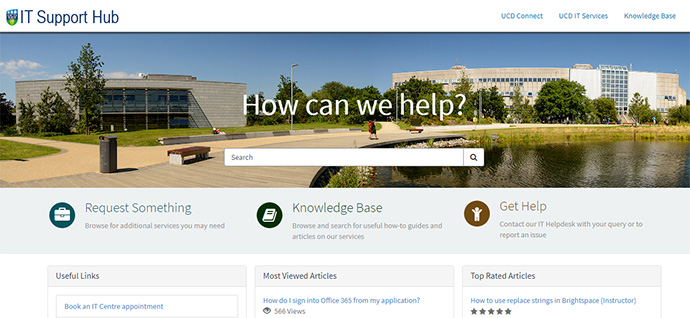
Device Health date for enforcement: 31 January 2025
.png)
Device Health
The Device Health Application is a small piece of software that runs on Windows and Mac workstations. Device Health is a process of analysing a device to determine whether it meets approved security requirements and is thereby trusted and authorised to do something, for example accessing University digital resources.
Project Phases
Phase I
Phase II
Phase III
Project Update November 2024
Phase II Communications - April to December 2024
Device Health has been rolled out in reporting mode to all staff UCD Connect accounts and from March 2024 all new staff Connect Accounts have been auto enrolled into the service.
This initiative ensures that our digital resources are effectively protected and computers and laptops comply with the University’s Device Protection Policy.
Phase III - January 31 2025 Date for enforcement of Device Protection Policy
On 31 January 2025 we will move to the enforcement phase. From this date all Windows and Macintosh computers and laptops will need to meet the following requirements in order to access central university digital resources:
- Must be running an Operating System that is supported by Microsoft or Apple.
- The Operating System must be running updates that are no more than 30 days old.
- A system password (or PIN) has been set.
- An approved Security Agent (antivirus software) is installed & running.

What is an End of Life Device?
End of Life devices are devices running operating systems that are no longer actively supported or patched by manufacturers for vulnerabilities and security issues. Once an operating system reaches the end of support, customers will no longer receive technical assistance, software updates, or security fixes leaving them open to exploitation by cybercriminals.In terms of Device Health an operating system can be defined as being either Microsoft Windows or Apple Macintosh.
(opens in a new window)How do I know if my Operating System is supported?
If a workstation can no longer be updated, the device should not be used to access UCD’s IT systems. A user with a device no longer in support should either move to using a supported system or replace the device. If a replacement device is required a user should discuss this with their Head of School or Head of Unit. Guidelines for purchasing new equipment can be found here:
(opens in a new window)Buying a new Windows or Apple computer
Project Background
To support the University's Device Protection Policy, IT Services on behalf of the University Management Team have procured a Device Health solution. This will allow the University control access to University Services, on Windows and Apple Mac computers, by ensuring they meet the requirements in the Device Protection Policy.
The selected product is DUO Beyond, a part of the DUO platform already in use for Multi Factor Authentication in UCD. The Device Health Application will be used to provide Device Health. The rules (as defined in the Device Protection Policy) will be applied to all Windows and Apple Mac computers accessing any University IT System or Application using our Single Sign On service, regardless of whether the device is University or personally owned, and of the physical location (on/off Campus) of the device.
Project Timelines
The below graphic provides an overview of the expected milestones within this project. These dates are provisional and subject to change depending on how the project processes.
-
January 2023
Pilot completed in IT Services
-
March 2023
Pilot Report Completed
-
April 2023
Rollout to all Staff
-
October 2023
Rollout to all Staff Completed
-
March 24
Phase I Complete
-
April 24
Phase II Commences: initial move to enforcement communications
-
June 24
1st Targeted communication to users of End of life devices
-
Oct 24
2nd Targeted communication to users of End of life devices
-
Nov 24
Enforcement date announced
-
Dec 24
Continuing communications to all users
-
Jan 25
Enforcement date 31 January 2025
FAQ's
How do I install the Device Health Application
Click here for Instructions for Microsoft Windows devices
Click here for Instructions for Apple Mac devices
Your Device may be running an unsupported Operating System, the Device Health Application will not install on that Device.
- Students & Student Devices
- Linux Devices (until client becomes available)
- Mobile Devices (Phones and Tablets)
- Devices on the UCD network that never access applications protected by SSO.
When we reach Phase III Devices NOT meeting the University’s Device Protection Policy will be blocked from accessing University Services e.g. Gmail, Brightspace, InfoHub. This is the enforcement Phase. What this means is that if you are trying to access a University service from a device that does not comply with the Device Protection Policy, your device will not be able to access that service.
Please note that UCD IT Services recommends and fully supports Sophos Intercept X. You submit a request (opens in a new window)here for Sophos Intercept X.
The list of antivirus applications recognised by Duo Desktop can be seen on the following URL:
(opens in a new window)https://duo.com/docs/duo-desktop#security-agent-verification
From the Apple menu in the top left-hand corner of your screen, choose About This Mac.
Check the information displayed against:
You can find out which Windows version is on your PC by running a simple command or by navigating to Settings. To run the command, Open the Start menu then type ’winver’ into the search box and then click Open.
Check the information displayed against:
The latest versions can be found here::
macOS:(opens in a new window) https://dl.duosecurity.com/DuoDesktop-latest.pkg
Windows:(opens in a new window) https://dl.duosecurity.com/DuoDesktop-latest.msi

Further Support
The UCD IT Support Hub is where you can log a call with our UCD IT Helpdesk team, find an answer in our Knowledge Base of articles, or request an additional service or access.
UCD IT Services
Computer Centre, University College Dublin, Belfield, Dublin 4, Ireland.Contact us via the UCD IT Support Hub: www.ucd.ie/ithelp
